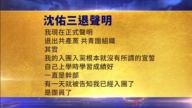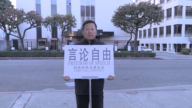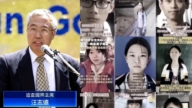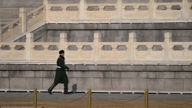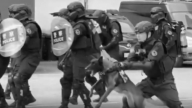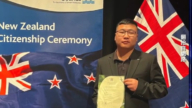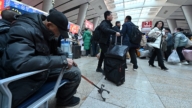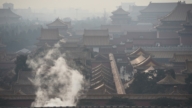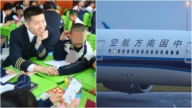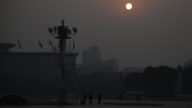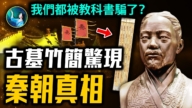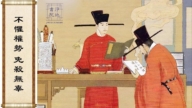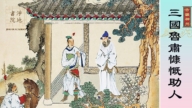【新唐人2014年02月05日讯】中国的国家机密无所不在,长期受到诟病,不少人因为所谓“泄露国家秘密罪”被送入监狱。日前,中共公布《保守国家秘密法实施条例》,要求官员不要再随意以模糊的“国家秘密”为借口,拒绝对外披露公众知情权中应该知道的信息。但是条例并没有说明哪些信息是可公开或不可公开。换句话说,保密事项范围,根据情况可及时调整。
中共公布最新《保守国家秘密法实施条例》,由中共国务院发布,中共总理李克强签署,预计3月1号起施行。
这项条例的总则规定,机关、单位不得将依法应当公开的事项,确定为国家秘密﹔并且不得将涉及国家秘密的信息公开。然而这份条例并没有说清楚,什么信息可以公开,什么样的信息又需要保密。
根据英国《路透社》报导,中国的“国家秘密法”非常模糊不清,它涵盖的内容,从每年被处决的犯人人数,到工业统计数据,甚至是污染数据,以及任何可追溯定义为国家机密的信息。
事实上,中共当局滥用所谓的“国家秘密罪”非法抓捕关押了不少人,上海律师郑恩宠就是其中一位。
郑恩宠曾代理上海的一些拆迁纠纷案件,并向中国上级政府告发上海高层的一些贪污案件,涉及的政商要人包括周正毅、黄菊、陈良宇、韩正等人。他在办案过程中收集整理的证据,成了当局定他泄密罪的证据。2003年10月,郑恩宠被当局以“向境外非法提供国家秘密罪”判刑3年。
上海律师郑恩宠:“中国到处都是国家保密法,政府任何一个丑闻都是国家秘密,所以说,我认为这个没有任何(帮助),这反而起到一种保护体制腐败的(作用)。”
郑恩宠表示,根据新的条例,各地方政府、或各个部门,会更加详细的把自己所有不宜公开的事情,都认为是国家秘密。这样使老百姓更无法参与国家事务,没法推动社会的进步,和参与政府的反腐,那么腐败将越来越多。
郑恩宠还表示,中共的《宪法》里,老百姓有知情权和结社与言论的自由。但是,言论自由是建立在国家秘密很少的基础上。他认为,什么都是国家秘密,保护的则是体制上的腐败。
郑恩宠:“国务院这个条例行政法规,他还不能完全执行的,还要到各省市的人大,通过地方法规,还有细则的,所以这么下来,我认为它没有任何的进步。”
《保守国家秘密法实施条例》总则规定,国家保密行政管理部门主管全国的保密工作。县级以上地方各级保密行政管理部门,在上级保密行政管理部门指导下,主管本行政区域的保密工作。
北京维权人士胡佳:“即使有了实施细则,那真正在执法过程中,许多可操作的空间,上有政策下有对策,这是我们中国各级地方政府是最为擅长的,所以你想拿这些去制约他很困难,就像宪法中写的公民35条款,公民权利条款有几时落实过,我觉得到后边的话,仍然会有很多公民因为涉及所谓国家机密这些方面,受到当局的报复,不会产生根本性的改善。”
北京维权人士胡佳,在奥运会前夕,因转发一份公安局在网路公开的文件,而被抓捕。
胡佳:“在我2008年被捕,就是被控煽动颠覆国家政权罪的时候,他们在几个月的时间内,阻挠我会见律师,他们当时的理由就是说我的案件涉及国家机密。”
大陆记者师涛去年9月获释。他因全球互联网入门网站“雅虎”公司,向中共当局泄露用户电邮内容,而遭当局以“为境外非法提供国家秘密罪”判刑10年。而以同样罪名被中共关入监狱的还有﹕前香港《文汇报》驻大连记者姜维平,和现居美国的香港学者徐泽荣等人。
最新的国家机密条例还警告中共官员,不仅需要将公共信息公开,还要对国家秘密保密。而对于那些向公众泄露过多信息的人员,将依法给予处分。
那么到底哪些信息才属于中国的“国家机密”呢?恐怕除了百姓和记者以外,中共官员也莫衷一是﹗
采访/常春 编辑/黄亿美 后制/郭敬
Latest Catch-All, State Secrets Laws – It’s All Over!!!
The long criticized state secrets exist everywhere in China.
Many Chinese have been jailed for divulging state secrets.
Recently, China has issued new rules telling officials not to
cover up what should be publicly available information using
the excuse it is a state secret.
However, they do not specify what’s public and what’s not.
In other words, the scope of the confidentiality is up to the
situation. How long is a piece of string?
The latest state secrets laws were signed by Communist Premier
Li Keqiang and issued by the State Council, effective March 1.
The regulation said, Organs and units have been told not to
label items that should be made public as state secrets,
and they should not publicize those related to state secrets.
However, the regulations remain vague as for what information
is public and what is considered secret.
Reuters reported, “China has notoriously vague state secret laws,
covering everything from the number of people executed every
year to industry databases and even pollution figures,
and information can be retroactively labeled a state secret."
In fact, the Marxists authorities have abused so-called
state secrets to illegally arrest and detain Chinese,
such as Shanghai lawyer Zheng Enchong.
Representative for the forced demolition dispute, Zheng Enchong
had complained to high officials about corrupt cases involving
both officials and businessmen in Shanghai,
such as Zhou Zhengyi, Huang Ju, Chen Liangyu, and Han Zheng.
The evidence he had collected turned out to be the stick
used to convict him of the crime of divulging state secrets.
Zheng Enchong was sentenced to three years in prison
in Oct. 2003.
Zheng Enchong, Shanghai lawyer: “There are state secrets
everywhere in China.
Any government scandals are state secrets.
I don’t think the new rules would help,
but rather a protection of the corrupt system."
Zheng Enchong says that under the new regulations,
local governments and units will further censor what they
believe inappropriate to disclose as state secrets.
The public will further be excluded from state affairs,
social activities, and anti-corruption campaigns.
The corruption will only get more serious.
Zheng Enchong also says that the regime’s Constitution
provides the rights to know, to assemble, and to express.
However, free expression is built upon minimal state secrets.
He believes that with the widening of state secrets,
the new rules only protect the corruption of the system.
Zheng Enchong: “Before the implementation of the State
Council’s regulations,
it will go through people’s congresses of provinces and cities
and local governments.
After it’s gone through the cycle, minimal improvements
are made."
The state secret laws regulate, the State Administrative
Department takes charge of national secrecy.
Under the guidance of the higher level administrative department,
local administrative department takes charge of the local secrecy.
Hu Jia, Beijing activist: “Even with detailed rules, there will
be operational space during the law enforcement, i.e.,
measures against the rules.
That’s what the local governments are good at, and why it’s
hard to control the local governments.
There are civil rights provisions in the Constitution, however,
they’ve never been implemented.
I believe many citizens will continue to be abused by the
authorities on the excuse of divulging state secrets.
There will be no fundamental improvement."
Beijing activist Hu Jia was arrested on the eve of the Olympics
for forwarding an online document of the Public Security Bureau.
Hu Jia: “I was arrested in 2008, accused of inciting subversion
of state power.
I was deprived of meeting with my attorney for months.
Their excuses were that my case involved state secrets."
Journalist Shi Tao was released last September.
He received 10 years jail time for releasing a document of
the Communist Party to an overseas Chinese democracy site.
The regime charged him based on the email record confirmed
by Yahoo!China.
Imprisoned on the same charges are also Jiang Weiping,
former Hong Kong journalist in Dalian,
and Xu Zerong, a Hong Kong scholar.
The latest state secrets laws also warn officials not to
disclose state secrets.
Those who divulge too much information to the public will be
punished according to law.
Exactly what information is state secret?
The consensus is probably hard to reach,
be it for the general public or the officials.
Interview/ChangChun Edit/HuangYimei Post-Production/GuoJing


